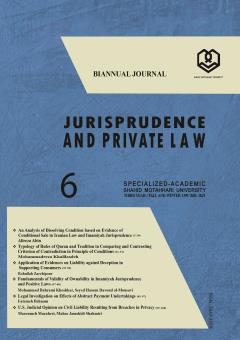-
-
-
Open Access Article
1 - Investigating Validity of Probative Evidences and Its Application in Jurisprudence and Islamic Law
Seyed Abolqasem Naqibi Elham Maghzi NajafabadiAbstract: The validity of probative evidences is one of the fundamental discussions in methodology of religion. Probative evidences (religious circumstantial evidences) are among the evidences needed for interpretation and inference of the Sharia rules, the signifiers o MoreAbstract: The validity of probative evidences is one of the fundamental discussions in methodology of religion. Probative evidences (religious circumstantial evidences) are among the evidences needed for interpretation and inference of the Sharia rules, the signifiers of which–in addition to comparative signified–have sometimes evidentiary effects. Evidentiary effect in methodology means the religious effects attributable to the rational instruments, necessities and requirements, either ordinary or accidental, which can be taken as evidence or codes of action. In case of the validity of probative evidence and its reasons, three theories may be put forth: Some jurists attribute the nature of evidence, in terms of proof, depending upon its validity thus rule on absolute validity of probative evidence. Some others, however believing in absolute validity of the probative evidence, have attributed the reason to the quality of proof and attribution of the reasons for validity of the evidence. The third group of jurists believe in a detailed manner which draws a line of separation between various types of evidence and probative evidences. Apparently, to study the validity of probative evidences, the reasons for validity of the evidence must be taken into consideration. Therefore, if the reason behind validity of the evidence is an instance of compulsory obedience, its probative reasoning shall not be valid but if it is based on logical and consistent usages (which is true in the case of the majority of cases) the criterion will be constraints in logical usages and related terms. This is because men of reason at times take something as evidence while at the same time reject its probative values, such as evidence on probation, possession, presumption of marriage bed, and confession. Manuscript profile -
Open Access Article
2 - Fundamentals of Validity of Ownability in Imamiyah Jurisprudence and Positive Laws
Mohammad Mohammad Baramai سيدحسن داودالموسویUnderstanding the fundamentals of ownability of a property is important in distinguishing property from non-property. Since jurists of Imamiyah jurisprudence have no consensus on definition of ownability of a property and the Civil Law has not specified what the proper MoreUnderstanding the fundamentals of ownability of a property is important in distinguishing property from non-property. Since jurists of Imamiyah jurisprudence have no consensus on definition of ownability of a property and the Civil Law has not specified what the property is by definition, the importance of understanding the fundamentals of ownability of a property has further come to light. This paper intends to find a unified criterion for validity of ownability of a property, analyze the criteria set by the jurists, and investigate the strengths and weak points of the expressed criteria. The criterion thus achieved helps distinguishing property from non-property in doubtful cases. Such power of distinction helps us in various issues since ownability is a matter of credibility and the right understanding of ownability and its attachments depends upon acquiring knowledge on credit concepts and its specifications. Therefore, this paper points to some instances of credits. The author of this paper is of the opinion that the major criterion for understanding ownability is the rational approach toward this subject and other criteria expressed are either problematic or abundant. The paper has finally discussed available solutions in case doubts appear in conventional and legal ownability of a property. Manuscript profile
List of Articles rational
-
The rights to this website are owned by the Raimag Press Management System.
Copyright © 2017-2024


